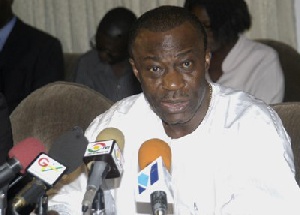The Minority in Parliament on Wednesday warned that Ghana stands the risk of slipping into the worst-ever economic recession if government does not rein in the country’s spiralling national debt and inexcusable budget deficits.
The side, argued, that contrary to the fiscal consolidations efforts being employed by government to fix the ailing economy, the “unbridled borrowing spree”, coupled with persistent energy crisis makes the economy vulnerable.
“We are in a quagmire characterised by corruption, persisting energy crisis, huge public debts, lamentable twin deficits, unpaid arrears, worsening employment, and failing social services…Things have to change drastically,” said Dr Anthony Akoto Osei, MP for Old Tafo and Ranking Member on Finance at a news conference to respond to the mid-year budget review presented to Parliament last week.
“Ghana has accumulated too much debt in the past six and half years. Seventy per cent debt to GDP (Gross Domestic Product) ratio is unsustainable so the rampant borrowing must stop.
“The country is getting too steeped in borrowing. Any country that is steeped in borrowing has lost control over its financials; and a country that has lost control over its financials has lost control over its destiny. Ghana is losing control over its destiny and the nation must wake up,” Dr Akoto Osei said.
Ghana’s debt stock current stands at GH?90 billion, excluding the 1.5 billion dollar Eurobond transaction recently approved by Parliament and more than 500 million dollars approved also recently by the Legislature.
The Minority have expressed trepidation that at the rate government is borrowing, from both domestic and foreign sources, the country’s debt serving would overrun the wage bill that currently stands at GH? 9 billion, fearing the out-turn to quickly create the kind of imbalance that could lead the country into the current situation facing the Greeks.
Finance Minister Seth Terkper last Tuesday, presenting a mid-year review of the budget statement and economic policy and supplementary estimates for the 2015 financial year to Parliament, disclosed that Ghana is to expect a decline in economic growth from the estimated 3.9 per cent to 3.5 per cent over the next six month.
He also gave a revised budget deficit target for 2105, indicating a deficit increase from 6.5 per cent of GDP to 7.3 per cent, with an upsurge in inflation from 11.5 per cent to 13.7 per cent. non-oil real GDP growth has been revised from 2.7 per cent to 2.3 per cent.
These developments, according to Mr Terkper, were necessitated by domestic and long standing global changes, citing exchange rate depreciation and rising inflation as downsides to the achievement of growth targets for the year.
The Minority said they are pessimistic about the measures government is taking, saying they are unrealistic and would not address the fundamental challenges of the economy but rather plunge the country into recession.
They said important indicators like inflation, energy and bank rates have not seen reductions, indicating that the fiscal consolidation measures government is taking is not having the desired effect on the economy.
The Minority thus urged government to evolve policies that would support stronger economic growth and reduce chronic high employment, as well promote real investment in the economy by increasing export base in order to strengthen the Cedi.
They said there is urgent need for the Bank of Ghana to pursue sound monetary interventions critical for maintaining a strong economy, because the present remedial action of pumping 20 million dollars daily into the economy is not sustainable.
Business News of Thursday, 30 July 2015
Source: GNA

















